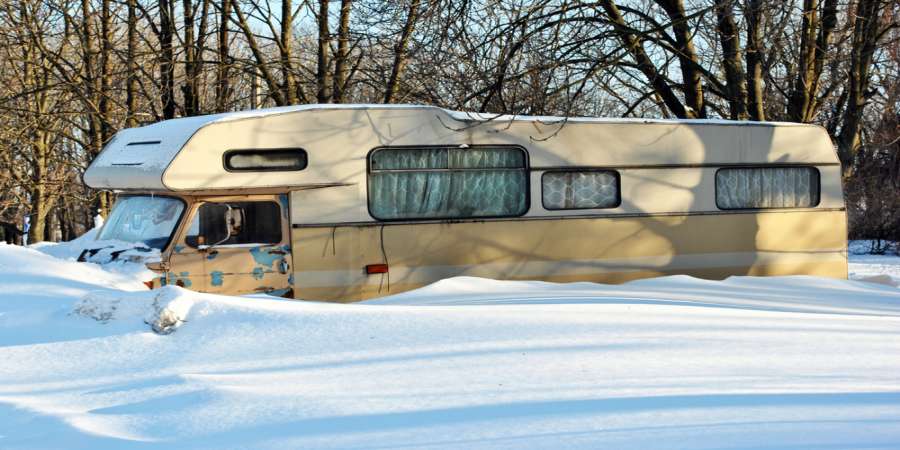The Most Common Damage To RVs During Winter
Winter can be a damaging time of year for vehicles, and especially for RVs. Between heavy winds, rain and snow, there is no shortage of damage potentially caused by the elements. If your RV is stored outside over the winter, the likelihood of damage increases quite a bit. A few that often sustain the most damage are:
- RV water pipes and tanks
- RV roof and structure
- RV battery life
Cold weather is hard on all of us, but in particularly freezing temperatures, it is especially important to take extra care of your RV to avoid winter specific damage. Damage can occur even before freezing temperatures hit and can leave you wishing you had taken action before winter was upon you. Prevent the following damage by taking time to research and carry out the proper steps to follow to protect your RV over the winter.
Burst Pipes And Frozen Tanks
Whether you’re traveling in your RV over the winter or it’s in storage, there is a chance your RV’s pipes and water tanks could be in jeopardy. Without proper care and maintenance ahead of time, you could be looking at a burst pipe, frozen water tanks or both the next time you encounter a big freeze.
To deter the damage of a burst pipe or frozen water tank, it is important to properly prepare your RV for winter before the cold hits. By running antifreeze down your drain and flushing antifreeze through your toilet, you can help prevent issues with your pipes and tanks due to freezing. Bringing plenty of bottled water along on your journey for drinking, brushing your teeth and cooking. Putting antifreeze in your black water and gray water tanks will prevent them from freezing while you are on the road.
Roof And Other Structural Damage When Stored Outside
However, while RVs are generally built very sturdily, they are more prone to roof and structural damage when stored outside for periods of time. Much of the reason for this is that temperature, seasons, humidity and the elements can take a large toll on RVs, with little or no time for you to try and protect your RV. Too much sunshine and your RV could experience cracks in its sealant. Excessive humidity and consistent rainfall can lead to water damage, mold and mildew, all of which can compromise the structure of your RV’s roof and siding. Intense winds can also wreak havoc on your RV’s sidings, awnings and windows. So what are you to do when storing your RV outside is your best option?
If indoor storage is not a good option for you, you can look into covered storage to provide some protection from rainfall and snow, or falling branches from trees in case of extreme wind. Over the winter, you should regularly check your RV for cracks in or missing sealant, soft spots that may have formed from water damage, and any vulnerable areas that might agitate potential damage.
RV Battery
When it’s time to say goodbye to your RV as it goes into winter storage, you should most definitely remove the battery and plan to store it in a warm, dry location. Leaving the battery in your RV all winter long can ultimately lead to long-term damage to the battery, necessitating replacement sooner than later, and no one wants that extra cost to their yearly RV maintenance!
To winterize your RV’s battery, connect it to a charger soon as you remove it from your RV to get it fully charged. Cleaning the battery terminals is a good idea to help your battery have the longest lifespan possible. Once you are satisfied with the maintenance to your RV’s battery, store it in a dry location that is warmer than the outside air until you are ready to get your rig back on the road in the summer months.
Shop DFWs Best Available RVs for Sale
Finding an RV for sale in the winter and this economy is difficult. However, for those interested in buying an RV, there hasn't been a better time to get a used RV for a great price. Make an offer on any of our available RVs in Dallas Fort Worth and you're likely to find a great deal.
